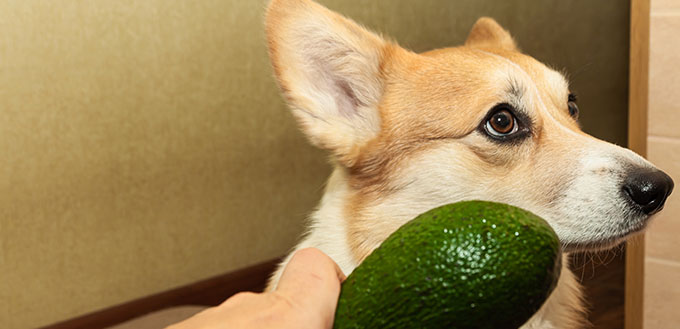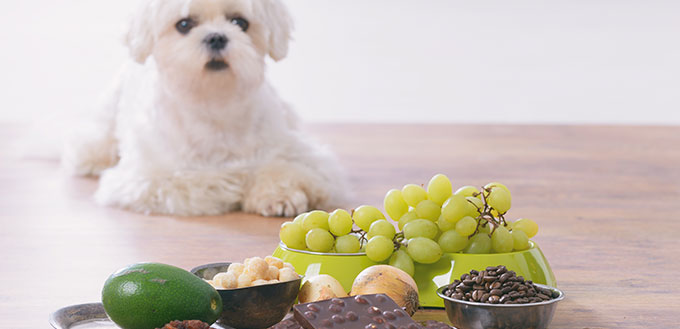A quick search online will show you a lot of conflicting results about feeding dogs avocados. The avocado fruit is held high on a pedestal for the benefits that it has for humans, despite the environmental impact that growing an avocado tree has. We’re here to put to rest the ongoing debate about feeding your dog avocado.
Can Dogs Eat Avocado?
Avocado is primarily considered one of the many human foods that we’re lucky enough to be able to have in our local supermarkets. Also called alligator pears, avocados are the fruit of avocado trees, and are picked so that humans can eat the green insides of the fruit.
You will find that most avocados are imported from Mexico, where the avocado plant naturally grows. Actually, you can find large quantities of the fruit growing anywhere from the south of Mexico to the Andean regions in the Western Hemisphere.
But can dogs eat avocado? You’ll be happy to know that if your dog eats this fruit, they’ll be absolutely fine – under certain conditions. For instance, dogs should only be eating the inner part of the avocado, but we’ll get into the whys later.
About the Avocado
Usually pear-shaped, the avocado has dark green skin but can also be dark purple in color. Inside, you will find light to dark green flesh, which may be yellow. A ripe avocado will yield buttery soft insides that have a nutty flavor.
The internal flesh of the fruit is interrupted by a large pit. The avocado pit is not typically eaten, nor is the outer skin of the fruit. Avocado pits can be dried and planted to grow new avocado plants, or the avocado pits can be eaten in various ways.
It’s unusual, but not unheard of, for avocado meal and avocado oil to be included in dog food. Avocado meal is a strange term, but it simply refers to the green or yellow flesh of the fruit that we humans also eat. Avocado meal, as an ingredient in dog food, does not contain any harmful parts of the avocado plant that could hurt your dog. Considering that the fruit does appear in dog food, surely that means that it is safe for dogs to eat?
You’d be correct in thinking that. There are parts of the avocado tree that should never be used in pet food because they can present choking hazards and even be toxic to dogs.
Avocado Nutrients
Nutrition per single, average avocado is as follows:
- Calories – 114kcals
- Fiber – 6 grams
- Sugar – 0.2 grams
- Monounsaturated Fatty Acids – 6.7 grams
- Vitamins – Vitamin A, Vitamin B, Vitamin E, Vitamin K
Also contains thiamin and riboflavin.
Are Avocados Good for Dogs?
If a dog ate the light green-yellow flesh of an avocado, there would be no repercussions. Dogs can eat avocados just like humans can, as long as they avoid eating the wrong bits of the plant that can be harmful to them.
For a dog eating an avocado, there are plenty of benefits. Avocados are full of healthy fats, healthy nutrients, and have high nutritional value. Among the nutrients of the avocado are fatty acids, which can help your dog maintain healthy skin, help them with their immune system, and may even assist them in the fight against canine cancer.
When a dog doesn’t eat enough food containing fatty acids that are required in their diet, you can tell. You can see the deficiency in a dog’s coat, which will be dull, and in their skin, which will be dry and flaky.
In limited amounts, the avocado flesh can be consumed by dogs for its various health benefits.
Why is Avocado Bad for Dogs?
The biggest concern of letting dogs eat avocado lies in the pit of the fruit. While the avocado flesh is perfectly fine to add to your dog’s food or give them as a treat, the pit contains some serious issues. Not only is the large sphere a choking hazard, but the seed of this fruit also contains a toxic agent called persin.
Persin can be found in the leaves, stem, skin, and seed (the pit) of an avocado and its plant. These other parts of the avocado present, if consumed in large quantities, a toxic effect. This isn’t too likely to occur, as most people don’t grow avocados in their backyard, but for anyone who does keep a large number of the plant on their property, it would be wise to clean up after it and keep a watchful eye over your dog when they are near it. Persin actually presents more of a problem for other animals, such as birds and large animals like horses. Though that doesn’t mean that your dog might not be allergic and suffer an allergic reaction to the toxic or the fruit, itself.
Beyond the toxin that can be found everywhere but the yellow-green inner avocado flesh, a dog owner must remember to carefully dispose of the pit of an avocado if they choose not to use or consume it.
If swallowed, the pit can easily get stuck anywhere along your dog’s intestinal tract and cause gastrointestinal upset (an upset stomach). Additionally, it could end up getting lodged in your dog’s throat, hence the choking hazard warning.
Can You Feed Your Dog Avocado?
When feeding your dog avocado, it’s important to control the portion size of the fruit. Avocados have a high fat content, and feeding your animals large amounts of an avocado may cause them to gain weight. Think of it like a treat or other high-fat foods that you allow your pup to eat.
Small amounts of avocado and similar fruits and vegetables can be great for your pet. A small piece of the inner part of these green fruits wouldn’t pose any problems for your pup.
As well as having fatty acids that can help your dog’s coat, skin, and immune system, the avocado has plenty of vitamins and antioxidants that can help keep your pet healthy. They can also be great for bone health!
You may also like our article on Weight Management Dog Food.
What Happens When a Dog Eats Avocado?
When your feed your pup the correct part of the avocado, your pet will just happily munch on it, digest it, and move on with their day.
But if your pet accidentally consumes the pit or another part of the avocado plant, you can expect them to experience some not-so-nice side effects, depending on how much they eat.
Persin consumption side effects:
- Diarrhea
- Vomiting
- Intestinal tract blockages
- Upset stomach
Dog parents who notice any of these symptoms or believe their pet has swallowed an avocado pit should immediately take their pet to a veterinarian.
A quick note here, feeding your dog too much avocado can also cause blockages and digestive issues. Avocado is incredibly high in fat, and large amounts of it have been shown to lead to pancreatitis.
The Health Benefits of Avocado
Avocados, despite their risks, carry enough health benefits that they’re worth adding to the existing foods in your dog’s diet if you regularly keep them in your home. There’s no sense buying them just for your dog because dogs can only eat such small amounts of avocados during the week.
The benefits of dogs eating these fruits include:
- Shinier coat
- Healthier skin and muscles
- Boosted Immune system
- Improved digestive health
- Brighter eyes
- Better nutrient absorption
- Better heart health
- May help fight canine cancer
- Reduced risk of heart disease
- Reduced risk of diabetes
FAQs:
Q: Can dogs eat guacamole?
A: Dogs cannot eat guacamole and we’re happy to explain why. Like many foods that we eat, guacamole has a lot of other ingredients added to it. Even just the addition of salt in a meal is a big no-no for dogs because it’s so detrimental to their health. Guacamole recipes usually call for onion, garlic, and tomatoes, all of which can be harmful to dogs or even outright toxic.
Q: Can dogs eat avocado toast?
A: Provided that what you’re essentially giving your dog is plain toast with plain (if smashed) avocado, your dog can absolutely have a small piece of avocado toast. Bread should not cause stomach upset in small quantities, much like avocado shouldn’t.
Q: How much avocado is too much avocado?
A: When feeding your dog food that you know is bad for them in large quantities, it’s best to err on the side of caution. We wouldn’t advise feeding your dog any more than half of a medium avocado’s inner fruit, and certainly not every day. Treat avocado like your dog’s regular treats and give it to them sparingly.









